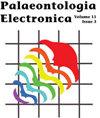现代植被指标反映了欧洲、土耳其和亚美尼亚的古近纪和新近纪植被演变和气候变化
IF 1.5
4区 地球科学
Q1 Earth and Planetary Sciences
引用次数: 2
摘要
最近,Drudge 1和2这两种工具被引入,以更容易地评估化石记录的现代植被指标。它们基于三个相似性:综合植物记录(IPR)相似性,根据主要地带被子植物成分的比例评估化石组合和现代植被之间的相似性;分类相似性(TS)反映了化石记录与现代植被之间基于属属一致性的相似性;以及两者相似性的组合(Results Mix)。在本文中,我们将Drudge 1和2应用于来自欧洲、土耳其和亚美尼亚的54个植物化石组合,涵盖了从始新世早期到更新世的时间跨度。对于每一个化石植物组合,Drudges都会得出一组25个代表(现代植被单元),反映其地貌和区系组成。所有化石植物组合的结果都以欧洲、土耳其和亚美尼亚的整体植被进化和气候变化为特征,为化石记录与现代亚洲和欧洲植被的关系提供了更深入的见解。这项研究致力于在专家群体之外,更好地了解欧洲和亚洲的古第三纪/新第三纪植被演化。我们的研究结果可以帮助模拟未来的情景。它们还提高了我们对气候变化如何影响植被和更广泛的生态系统的理解。Johanna Kovar Eder。斯图加特国家自然历史博物馆,罗森斯坦1号,70191斯图加特,德国。johanna.eder@smns-bw.dePetr Mazuch。捷克共和国布拉格经济大学信息学和统计学院。mazouchp@vse.cz瓦西里斯·特奥多里迪斯。捷克共和国布拉格查尔斯大学教育学院生物与环境研究系。vasilis.teodoridis@pedf.cuni.czAnita Roth Nebelsick。斯图加特国家自然历史博物馆,罗森斯坦1号,70191斯图加特,德国。anita.rothnebelsick@smns-bw.deKOVAR-DER等人:植被进化与气候变化2 Christopher Traiser。图宾根大学地球科学系,Schnarrenbergstr。94-9672076德国图宾根。christopher.traiser@uni-tuebingen.deJanina Wypich。斯图加特国家自然历史博物馆,罗森斯坦1号,70191斯图加特,德国。janina.wypich@smns-bw.de本文章由计算机程序翻译,如有差异,请以英文原文为准。
Modern vegetation proxies reflect Palaeogene and Neogene vegetation evolution and climate change in Europe, Turkey, and Armenia
Recently two tools, Drudge 1 and 2, were introduced to more easily assess modern vegetation proxies for the fossil record. They are based on three similarities: the Integrated Plant Record (IPR) Similarity assessing the similarity between fossil assemblages and modern vegetation based on the proportion of major zonal angiosperm components; the Taxonomic Similarity (TS) reflecting the similarity based on the coincidence of genera among the fossil record and modern vegetation; and the combination of both similarities (Results Mix). In this paper, we apply Drudge 1 and 2 to 54 fossil plant assemblages from Europe, Turkey, and Armenia covering the time span from the early Eocene to the Pleistocene. For every fossil plant assemblage, a set of 25 proxies (modern vegetation units) is derived by the Drudges, reflecting its physiognomy and floristic composition. The results for all fossil plant assemblages feature the overall vegetation evolution and climate change in Europe, Turkey, and Armenia providing deeper insight into the relationships of the fossil record to the modern Asian and European vegetation. This study strives to provide an improved understanding of the Palaeogene/Neogene vegetation evolution in Europe and Asia beyond the community of specialists. Our results can help model future scenarios. They also improve our understanding of how climate change may affect vegetation and more broadly ecosystems as a whole. Johanna Kovar-Eder. State Museum of Natural History Stuttgart, Rosenstein 1, 70191 Stuttgart, Germany. johanna.eder@smns-bw.de Petr Mazouch. Faculty of Informatics and Statistics, University of Economics, Prague, Czech Republic. mazouchp@vse.cz Vasilis Teodoridis. Department of Biology and Environmental Studies, Faculty of Education, Charles University, Prague, Czech Republic. vasilis.teodoridis@pedf.cuni.cz Anita Roth-Nebelsick. State Museum of Natural History Stuttgart, Rosenstein 1, 70191 Stuttgart, Germany. anita.rothnebelsick@smns-bw.de KOVAR-EDER ET AL.: VEGETATION EVOLUTION AND CLIMATE CHANGE 2 Christopher Traiser. University Tübingen, Departement of Geoscience, Schnarrenbergstr. 94-96, 72076 Tübingen, Germany. christopher.traiser@uni-tuebingen.de Janina Wypich. State Museum of Natural History Stuttgart, Rosenstein 1, 70191 Stuttgart, Germany. janina.wypich@smns-bw.de
求助全文
通过发布文献求助,成功后即可免费获取论文全文。
去求助
来源期刊

Palaeontologia Electronica
地学-古生物学
CiteScore
3.60
自引率
0.00%
发文量
20
审稿时长
>12 weeks
期刊介绍:
Founded in 1997, Palaeontologia Electronica (PE) is the longest running open-access, peer-reviewed electronic journal and covers all aspects of palaeontology. PE uses an external double-blind peer review system for all manuscripts. Copyright of scientific papers is held by one of the three sponsoring professional societies at the author''s choice. Reviews, commentaries, and other material is placed in the public domain. PE papers comply with regulations for taxonomic nomenclature established in the International Code of Zoological Nomenclature and the International Code of Nomenclature for Algae, Fungi, and Plants.
 求助内容:
求助内容: 应助结果提醒方式:
应助结果提醒方式:


